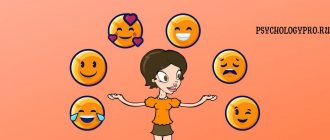Emotions accompany a person every second of his life. Sometimes they turn out to be pleasant and serve a supportive function, and sometimes they completely take over the entire thought process, making it impossible to adequately perceive reality. And in each individual case we are talking about the interaction of emotions and intellect. However, there is also such a thing as “emotional intelligence”.
Intelligence is a person’s ability to think, solve problems, process information and use new experiences for self-development. While emotions are responsible for changes in mood that are caused by external factors and stimuli. For example, bad news causes irritation and anxiety in a person, and upcoming good events invariably cause excitement. All these are factors to which the human body adapts.
A person can not be led by emotions and use them for his own benefit thanks to emotional intelligence. This term (from the English emotional intelligence) means a person’s skill in which he is aware of emotions, can manage them and even read them from himself to everyone who is part of his daily environment.
Emotional intelligence as a concept
The concept of emotional intelligence was introduced in the late 90s by US psychologist Daniel Goleman. But even before the official recognition of this term, there was also the term “social intelligence”, which meant the ability of people to adapt to their environment and calmly perceive their interlocutors, being able to hide some emotions and see what the mood of others is.
Research conducted by Goleman has shown that people who have developed emotional intelligence have good mental health, have leadership skills and are highly effective workers. At the same time, emotional intelligence is responsible for leadership skills. In professions that are directly related to stress, the ability to cope with one’s own emotions and high emotional intelligence are sometimes valued above any other knowledge.
“Change your attention and you change your emotions. Change your emotions and your attention will change.”
Frederick Dodson
IQ and EQ: common characteristics and differences
Intelligence typically has many definitions, of which only a few relate to the ability to adapt, perceive and overcome problems, and acquire and use knowledge. The life of a particular person depends on his existence in groups, and all his abilities are influenced by the changes that he causes by his own behavior in the social environment. Thus, it turns out that IQ without EQ is worth little.
Since emotional intelligence is a relatively new term, it is much more difficult to assess. But the same difficult situation arises with IQ: there are many different methods for assessing general intelligence, but none of them can be called ideal.
Often a person’s place in the social and business environment depends on his IQ, as well as personal achievements, which are generally believed to be directly related to his level of intelligence.
People with emotional intelligence are considered good candidates for leadership positions. However, ability without the desire to work hard and hard is a waste of potential.
Until now, the entrepreneur's formula for success has been this:
good potential + hard work
But even this does not work without developed EQ.
What does emotional intelligence mean in psychology?
Today, thousands of experts consider emotional intelligence as one of the most powerful human abilities. It can be easily corrected and developed, even if initially poorly developed.
Throughout the psychological research of the 20th century, several theories about emotional intelligence have appeared. The creators, leading psychologists in the world, described the main factors that are responsible for the symbiosis of intelligence and emotional state.
Goleman's model of emotional intelligence
Daniel Goleman divides emotional intelligence into 4 components:
- Self-awareness. This is a skill that allows you to analyze human emotions and intuition. This is an awareness of which aspects of the personality are considered strong, and where the limit of possibilities is. In addition, self-awareness is characterized by a feeling for oneself and a real appreciation of one’s talents.
- Self-control. This component of emotional intelligence includes the ability to take control of destructive emotions and impulses. People with self-control are able to quickly adapt to any situation, know how to seize opportunities, have reliability and honesty, and the ability to positively assess current events.
- Social sensitivity. This component manifests itself in a special talent - to hear the feelings of others, to take their place and take part in their lives and help them. For people who are in leadership positions, sensitivity is also manifested in understanding the hierarchy in the team and the ability to satisfy the requirements of customers or subordinates
- Relationship management. This component of emotional intelligence is characterized by a trait in which a person motivates others and can force anyone to follow him. Such people have the gift of persuasion, the ability to quickly resolve disagreements in a team, maintain social connections and create teams of like-minded people.
Read more: Attention - properties and features
Goleman's model shows how important it is to encourage a person to develop his personal qualities, which subsequently contribute to achieving success in many areas.
Emotional intelligence in the Mayer-Salovey-Caruso model
US specialists Mayer and Salovey Caruso have developed their own model of emotional intelligence. Work on it has been going on for many years. But the result was a new theory that includes four components.
- Emotion assessment and perception. The authors of the concept believe that this is the essence of the development of emotional intelligence, which lies in the ability to distinguish between emotions and understand their content. To confirm their theory, psychologists gave an example of the expression of sadness or happiness on the faces of other people. These expressions are the same for all people, which means they can be recognized. Children's emotions are easy to read because they have not yet learned to hide them. Adults try to hide all emotional manifestations, but microexpressions can still give them away.
- Using emotions for self-efficacy. According to psychologists, this component consists of recognizing the power of emotions and using them to your advantage. A person learns to maintain concentration on his main tasks. With a positive attitude towards them, a person begins to work more effectively. Even a person's brain becomes more active if a person has a positive attitude.
- Understanding the emotional background. This is a person’s ability to see the cause and source of a particular emotion, to realize the difference between thoughts and emotional impulses and emotions. According to the authors of the concept, it is important for a person to learn to perceive any emotion as a data carrier. If a person is constrained by fear, he can choose how to react to it - attack, freeze with fear, or run away from it. Some emotions can be transformed. A person can also notice how to change the sensory mood with the power of thought
- Emotional background assessment. It consists in the fact that a person uses emotions as steps to achieve personal results. But in order to begin to control the emotional mood, both your own and that of other people, you need to be in a constant state of awareness; it will allow you to remain calm and observant.
In psychology, emotional intelligence is considered along with another concept that studies the relationship between the mind and emotions. It is called the emotionality coefficient, or emotional quotinent. It was introduced by psychologist and journalist Ruven Bar-On.
The scientist presented a whole structure, which consists of a symbiosis of features. All of them together become the determining factor in how a person will behave in the future. Bar-On took IQ as an example and designated the emotionality factor with the letters EQ.
The Ruven Bar-On model includes several main components:
- self-knowledge;
- people interaction skills;
- the ability to adapt to different circumstances;
- the ability to easily get out of stressful situations;
- ability to control mood.
History of the study
The earliest roots of emotional intelligence research can be traced to the work of Charles Darwin, who noted the importance of emotional expression for survival as well as adaptation.
In the 1900s, although traditional definitions of intelligence emphasized cognitive aspects such as memory and problem solving, a number of influential researchers in the field of intelligence began to recognize the importance of non-cognitive aspects . So in 1920, E.L. Thorndike coined the term "social intelligence" in his work to describe the skills of understanding and managing other people. In 1940, David Wexler described the influence of non-mental factors on intellectual behavior. He argued that the models of intelligence considered by science will not be complete until we can adequately describe the above factors. In 1983, Howard Gardner, in his work Frames of Mind: The Theory of Multiple Intelligences, introduced the idea of multiple intelligences, separately considering interpersonal intelligence (the ability to understand the intentions, motives and desires of other people) and internal personal intelligence. intelligence (the ability to understand oneself, evaluate one’s feelings, fears and motives). According to Gardner, traditional measures of intelligence, such as IQ, are not able to fully explain a person's cognitive abilities and characteristics.
The concept of emotional intelligence (EI) as such appeared in psychological science at the end of the 20th century. Its founders were American psychologists D. Caruso, P. Salovey and J. Mayer, who considered emotional intelligence as a set of mental abilities to understand one’s own emotions and the emotions of other people. In the opinion of M. O. Zhuravlyova, in domestic psychology the need for the emergence of the term “emotional” intelligence" was determined by the development of research in the field of emotions and intelligence, the study of the connection between mental and affective in the structure of mental activity, as well as the study of emotional abilities. Thus, in modern psychological theory and practice, such features of the emotional sphere of personality as empathy, impressionability, emotionality and emotional stability have been widely studied.
Why emotional intelligence is important
Self-control in a world where a person is constantly accompanied by stress is a very important property. But many people get stuck at a level where emotions take precedence over reason, depriving a person of the ability to reason sensibly. And if children can be taught from infancy the skills of understanding feelings and managing emotions, then developing the emotional intelligence of adults is a more labor-intensive process. And it is important to start with the separation of feelings and emotions.
Read more: What is laziness
| Emotions | Feelings |
| An emotion is a short-term impulse with which a person reacts to external stimuli. Minor troubles cause equally minor outbursts of emotions. They flare up like a match and instantly burn out, giving way to other emotions. | Feelings are a long-term and stable attitude towards a phenomenon or person. Feelings tend to establish a close emotional attachment to an object or phenomenon, which can last for quite a long time. |
| Emotions cannot always be understood. Sometimes a person cannot understand exactly what emotion he is feeling. Often this is a whole set of different shades of the same condition. | Feelings always have a clear awareness and description. A person always understands that friendship is friendship, happiness is happiness, and love is love. |
| Emotions are difficult to hide and control. An unexpected outburst of anger or fear is sure to be reflected on the face, even if the person does not want to show it. | Feelings arise in the depths of consciousness and exist there, invisible to others. A person can hide and control them. |
EI in business and management
A leader with highly developed emotional intelligence is able to adjust his emotions to the requirements of the situation, he can speak loudly and splash out emotions when necessary, and, conversely, behave with restraint if the circumstances for achieving the goal have changed.
Women are more emotional than men, and are able to determine their true mood by the intonation of their interlocutor, his facial expression and other non-verbal signs, and are accordingly more inclined towards emotional intelligence.
Men, on the other hand, are more self-confident, better able to adapt to changes and cope with stress.
IQ and emotional intelligence are not only not the same thing, they often act as antagonists.
Often, professionally excellent specialists are completely unable to adapt to a team and, despite their brilliant skills, their career either does not advance or fails altogether.
The ability to listen carefully to others makes a person interesting to others and increases his authority in the team.
However, emotional intelligence cannot be considered a panacea for success and a guarantee of excellent results and super-profits for the company, although its role is definitely leading.
Business representatives will be interested in the work of the famous coach, business trainer Radislav Gandapas.
Presentation: practice in sales.
An example of emotional intelligence
An example of emotional intelligence is a story from our reader.
I contacted the bank with a request to prepare a certificate on the status of accounts at the beginning of the year. The specialist informed me about the need to fill out an application and the period for producing a certificate of 30 days. In this case, the branch employee will inform me about readiness by phone.
It’s amazing: it would seem that everything is in the database - just set the parameters and print.
After a month, without waiting for a call, I contacted the branch. The specialist found the prepared certificate, but it did not contain all the information I needed.
I was surprised by the lack of a unified form of certificate, assuming that this is required for all civil servants.
To prepare a more complete certificate, it was necessary to fill out the application again. Cool, yes: wait a lot of time and... Wait the same amount. Can you feel how annoyed I was?
Due to the fact that the deadline for submitting an income certificate at work was already approaching, I did not have the opportunity to wait another 30 days.
I insisted on filing a complaint with a specialist of a higher rank, but it turned out that there was no one in the office except ordinary employees (or they didn’t want to bother them?!).
To avoid a conflict situation, three employees worked together to figure out the possibility of promptly preparing the certificate I needed.
They also say that emotional intelligence is something ephemeral.
Components of emotional intelligence
When starting to study your own emotional intelligence, it is worth remembering that it is divided into two types: intrapersonal and interpersonal intelligence.
Intrapersonal intelligence
Essentially, this is a series of characteristics by which one can determine how a person treats himself:
- Self-awareness is the search for one’s personal abilities, awareness of the strengths and weaknesses of personality that affect others.
- Self-regulation. It lies in the ability to manage your emotional states and be able to focus on them. In addition, this skill allows you to quickly cope with stress and find solutions to complex issues.
- Self-motivation. This is the ability to recharge internally to achieve goals and the ability to maintain strength, perseverance and a positive mood when achieving a goal.
- Self-reinforcement. It consists of a good perception of oneself under any circumstances. The ability to praise yourself, your own personality and come up with rewards for yourself, always keeping a positive attitude in life in your soul.
Interpersonal or intrapersonal intelligence
This is, in fact, a whole set of skills and various abilities that form a person’s relationship with others. Basic skills:
- Empathy. It lies in the ability to hear and understand the emotions of others, to understand the motives of actions and to empathize with them. Empathy allows you to suppress conflicts before they arise. This skill is not innate; it is taught from childhood. Mandatory conditions for its development are to perceive people as they are, while being able to imagine oneself in the role of another person, without dissolving in him and maintaining one’s own individuality.
- Social skills. They allow you to positively communicate with other people, regardless of their assessments, without succumbing to rumors and their attempts to change your own decision. Also, these skills allow a person to maintain a positive attitude towards himself and protect his own interests in a conflict situation.
Conflict management skills
What is this:
- ability to resolve conflicts;
- predict and prevent their development and aggravation;
- resolve the consequences of conflicts;
- work in current conflict situations that cannot be resolved right now;
- transform destructive conflicts into constructive ones that are beneficial;
- analyze past conflicts, find their causes and triggers, apply experience to prevent recurrence in the future.
Why are they needed?
To prevent conflict at its first signs and avoid a decrease in team performance. If a conflict occurs, resolve it as quickly as possible without loss for the work process, the team as a whole and, if possible, each of its participants. Benefit your workflow and your company.
How to check:
- Ilyin’s conflict personality test;
- Ilyin’s test for personal aggressiveness and conflict.
How to upgrade:
“Conflict Management”, Viktor Sheinov
A book about the mechanisms of the emergence and development of conflicts, their typology. The author analyzed conflicts in families, educational and work groups and proposed a technology for managing them. The material is useful for those who want to learn how to prevent and resolve conflict situations.
"Leadership Through Conflict" by Mark Gerson
A book about everyday and work conflicts and people’s behavior in them. The author tells how to hear your opponents, take into account the interests of the parties and act as a leader in resolving conflicts. A publication for directors of organizations and managers at all levels who want to increase productivity.
“Conflict is a gift. How to channel the energy of disagreement into a peaceful channel, Nate Regier
A publication about conflicts and ways to resolve them competently for team prosperity. The author provides theoretical information and practical examples from life and work situations. A book for those who want to work in effective teams.
Levels of Emotional Intelligence
Each person’s level of emotional intelligence depends on the conditions of growing up, upbringing and family relationships. There can be no average values here. That is, intelligence can be either high or low. These levels are determined using the following characteristics.
A person with high emotional intelligence:
- is aware of his own emotions and can interpret them;
- knows how to behave in such a way that his emotions do not hurt others;
- strives to develop and develop inner peace;
- knows how to create a motivational mood.
Read more: Developing thinking
A person with low emotional intelligence:
- not confident in one's abilities;
- irritable and conflicted;
- does not know how to restrain emotions;
- strives to keep everyone and everything under control.
If characteristics from the second list predominate in a person’s life, this is a clear signal to begin developing oneself.
Potential Difficulties for People with High EQs
In fairness, it is necessary to mention the possible disadvantages of increased emotional intelligence. Balance is required everywhere, and too much EQ can be just as dangerous as too little.
- Scientists have confirmed that people with high EQ are often characterized by low creativity and do not generate innovative ideas.
- People with a high level of empathy do not know how to express criticism, which makes their life more difficult, completely ignoring the shortcomings of other people because of their fears.
- Well, the most significant thing is that people with high EQ are often used for their own purposes. Manipulative interaction schemes are used.
How to use emotional intelligence
High emotional intelligence allows a person to control the entire sensory and emotional component of life. In this way, a certain balance arises. It allows a person to achieve results in all areas of life, while maintaining a sense of stability, good relationships with others and a positive attitude.
Possessing emotional intelligence allows you to keep all events and circumstances in life under control. There is a simple way to check whether this level is high. People exhibiting high EQ exhibit:
- confidence;
- curiosity;
- awareness of intentions;
- self-control;
- creativity;
- the ability to maintain communication, improve connections with people, develop empathy and love for others.
With these skills, you can use emotions as a tool to build connections and improve your sense of self.
How is EQ measured?
Typically, not a general metric is used, but several different ones, depending on the specific EQ component.
- There is a test to assess communication skills from Ilyin.
- Mikhelson's communication skills test.
- Test for assessing the level of motivation from Ehlers.
- Test for the degree of motivation and fear of failure from Rvan.
- Mehrabian empathy level assessment system.
- Test of human empathic abilities from Boyko.
- Ilyin has a test for the degree of conflict of an individual and a test for checking the level of personal aggression.
Emotional Intelligence Training
If a person still finds it difficult to control emotions, and some skills leave much to be desired, then you can independently develop emotional intelligence. To do this, you need to divide self-study into several stages.
- Study of emotions. At the first stage, it is important to understand what emotions are, how they arise, how they develop, and how they can be used for your benefit.
- Understanding the location of emotions. This stage takes quite a lot of time, but allows a person to learn to listen to himself and his own body. It often gives clues as to what kind of emotion a person is experiencing. For example, fulfillment is reflected in the chest, and anger can cause a headache.
- Regulating emotions. At the third stage, you need to learn to manage your emotions. Constant training will help with this. Chief among them is observing yourself in different situations. It is important to remember your behavior and try to change it if it is destructive.
- Learning to interact with society. This stage is mainly about developing empathy. That is, the skills of empathy for others and their support.
Managing emotions effectively requires constant practice. Various methods of developing emotional intelligence and exercises will help with this.
- Working with the body. This method allows you to control your own emotions with the help of your body, unnoticed by others. For example, clench and unclench your fists, or stand on your tiptoes several times. When it is difficult to contain emotions, these methods will help to quietly cool down the ardor and maintain calm.
- List of problems. This technique involves making a list of all the troubles that have been bothering you lately. After completing the list, you need to start solving everything written. As you decide, emotions will gradually recede into the background, and a positive attitude towards life will become the main feeling.
- Emotional motivator. This practice is designed for those who do not get along well with others. It consists of compiling a list and further implementing various methods of maintaining the spirit of excitement and fun in the team. Even if a person was previously closed and complex, then for further development it is worth taking the first step and gradually starting to open up.
Olga Figura
Model of abilities for diagnosing the level of development of EI
This is the most developed and complex technique, otherwise called MSCEIT (Mayer-Salovey-Caruso Emotional Intelligence Test).
The ability-based model views emotions as a useful source of information to help make sense of and navigate the social environment.
The model suggests that people differ in their ability to process information of an emotional nature and in their ability to link emotional processing to broader cognition.
This ability manifests itself in certain adaptive forms of behavior.
The model states that EI includes four types of abilities that can be measured by a test:
1. Emotion perception (accuracy of judgment and expression) - the ability to detect and decipher emotions in faces, images, voices and cultural artifacts, including the ability to identify one's own emotions.
Perceiving emotions is a core aspect of emotional intelligence because it enables all other processing of emotional information.
2. Use of Emotions - the ability to use emotions to facilitate various cognitive activities such as thinking and problem solving. An emotionally intelligent person can take full advantage of his changing mood to best cope with the task at hand.
3. Understanding emotions - the ability to determine the source of emotions, understand the language of emotions and the complex connections between them. For example, understanding emotions involves the ability to be sensitive to small differences between emotions, as well as the ability to recognize and describe how emotions develop over time.
4. Emotion management - the ability to regulate emotions both in yourself and in others. Consequently, an emotionally developed person can use emotions, even negative ones, and manage them to achieve intended goals.
About the Ability Model Emotional Intelligence Test
So, the test contains 4 blocks of questions on the above aspects.
For each task, several answer options are given; the test taker must choose the one closest to him.
Scoring can be done in several ways - based on consensus (the score for a particular answer option is correlated with the percentage of a representative sample that chose the same option) or on expert assessment (the score is correlated with the proportion of a relatively small sample of experts who chose the same answer).










